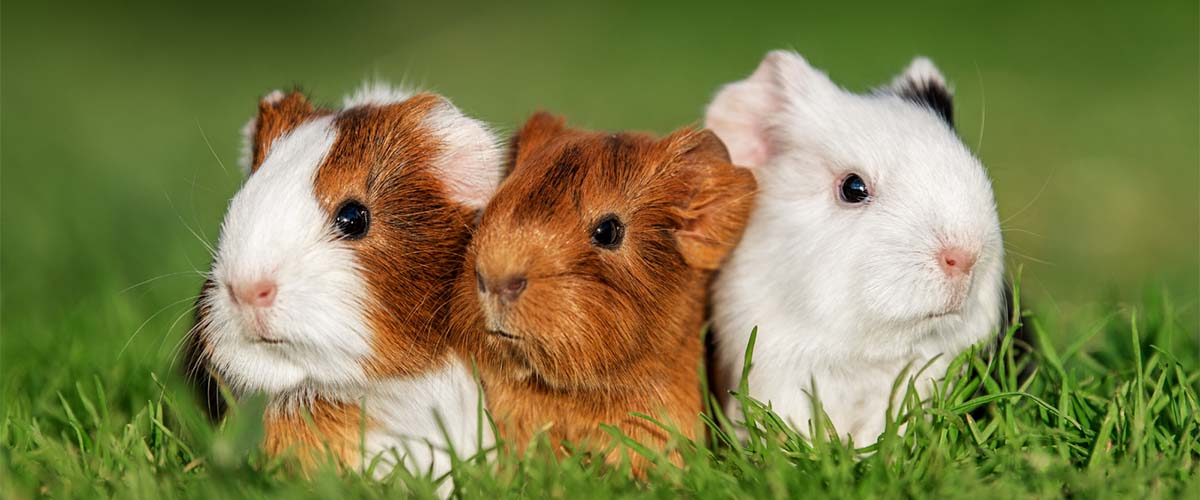Are mice good pets?
Mice are lively, intelligent creatures that love to explore. They are fascinating to watch, and while they don’t tend to enjoy being picked up, they might like a gentle stroke or a treat from a familiar hand. Mice are active at night but can adjust to a new routine.
If you enjoy watching animals and don't mind their nocturnal nature (meaning they are most active at night), mice can be a rewarding pet. If you're looking for a cuddly companion, you might want to consider a different animal.
Do mice need to live in pairs or groups?
Mice are very sociable animals so they need company of their own kind to stay happy.
- Female mice are usually very happy to live with each other and accept unknown females into the group.
- Males can live together if they have been together since birth but will rarely accept new males into the group.
- One male and one or more female mice often works well, but the male needs to be neutered to avoid unwanted pregnancies.
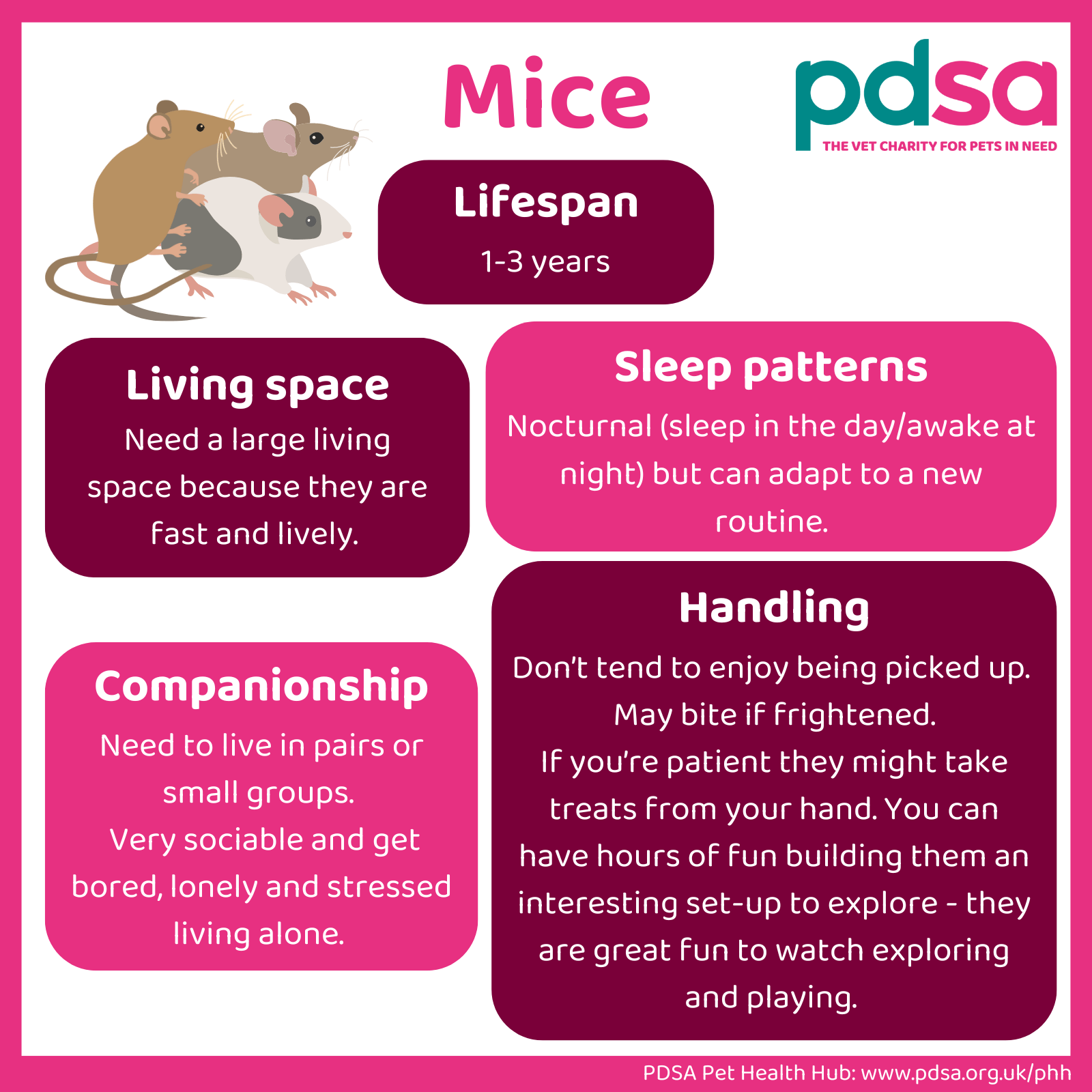
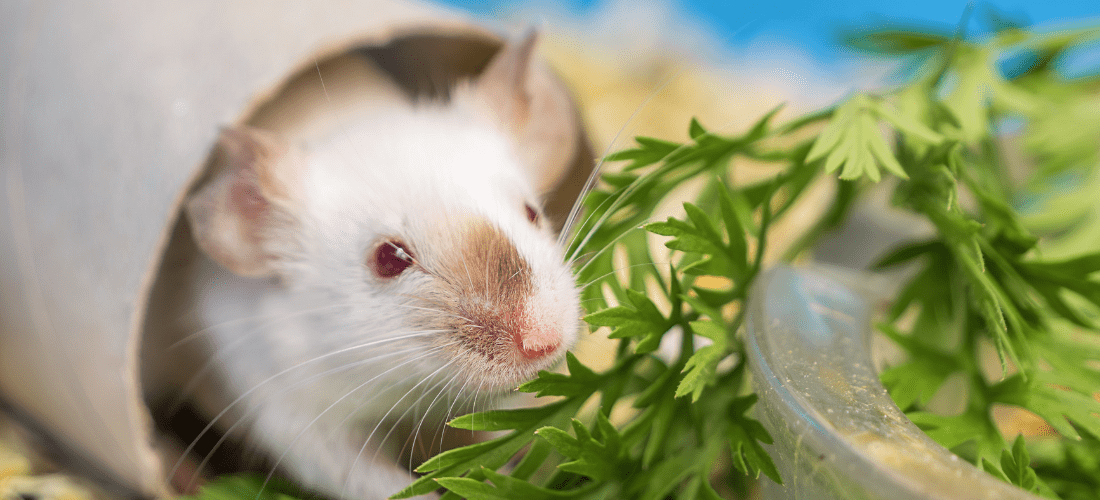
In the wild, mice are always on the move, searching for food. They eat lots of different things like plants, seeds, and grains, and sometimes they even eat insects!
For pet mice, you can buy special food at the pet shop. There are two main types to choose from and both contain everything mice need to stay healthy:
- Muesli-style: This type of food has lots of different bits in it. Mice love variety so often prefer a muesli-style mix. However, if they start leaving certain parts of the mix, you may need to swap them to a pelleted food to ensure they are eating a balanced diet.
- Pellets: Each pellet contains all the nutrients your mice need, and because all the pellets are the same, your mice can’t pick out their favourite bits and leave the rest.
Mice love to rummage for their food, so scatter it around their cage instead of in a bowl. This is fun for them and is particularly useful if you have one mouse that’s over-protective of their food bowl.
Don't forget: Mice need fresh water every day.
Treats are fun, but only give tiny bits. Too many will make your mice overweight. Check out the picture below to see what you can safely give your mice as treats.
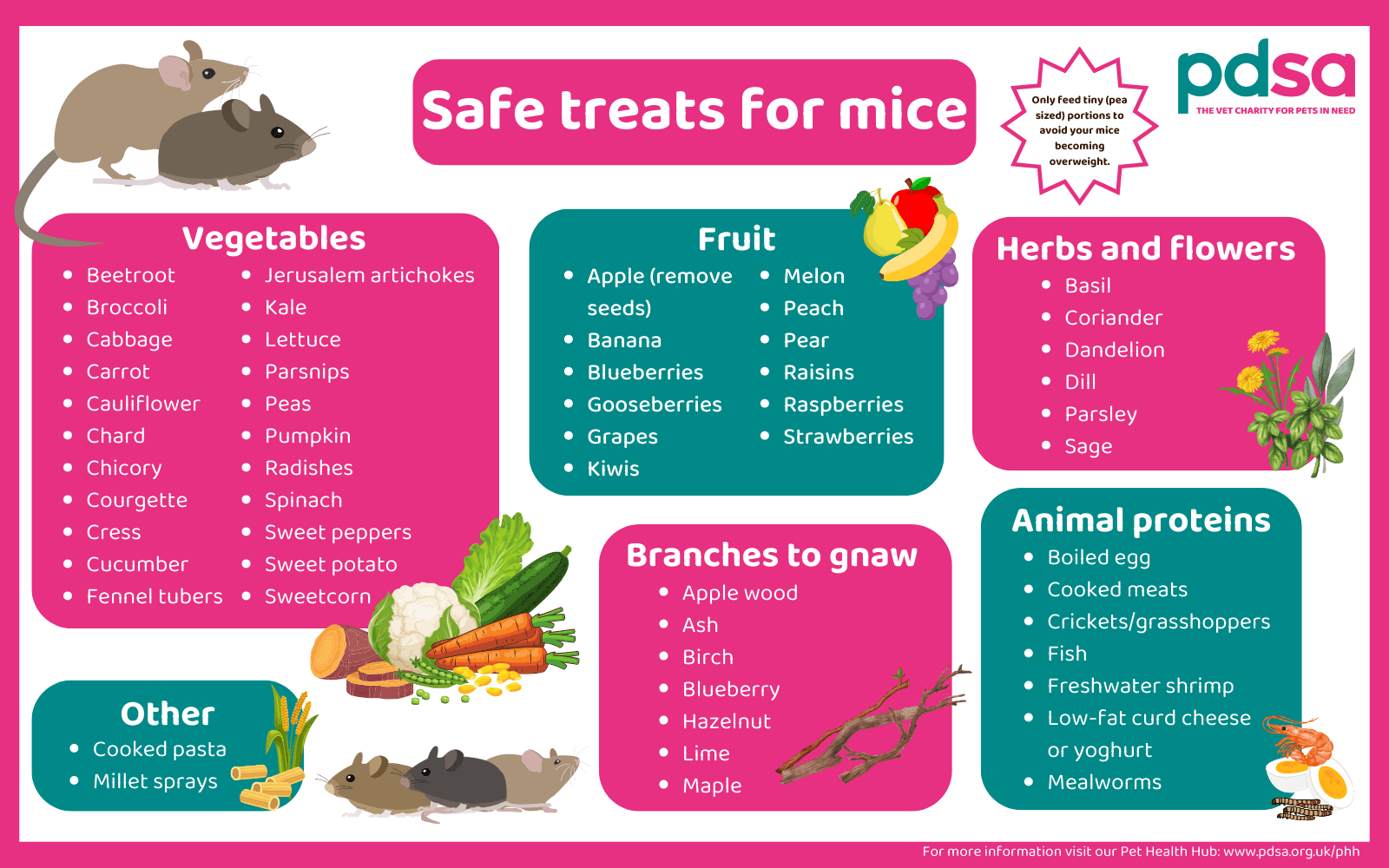
What type of mouse cage is best?
Most mouse cages sold in pet shops are not nearly big enough, so when choosing (or building) a cage you’ll need to make sure it has:
- Lots of space. Mice need plenty of room to run, jump, and explore, just like they would in the wild.
- Different levels: This lets them climb and explore.
- Solid flooring: Wire floors can hurt their feet.
- Good air flow: Fresh air is important to prevent breathing problems. Barred cages are best as long as the bars are no more than 6mm apart. Avoid glass or plastic cages.
- Bedding: mice need a deep layer of bedding at the bottom of their cage for burrowing and absorbing urine. Read more below about safe bedding materials for mice.
- Nests: Mice love to build nests. Give them a few different nest boxes to choose from and some soft materials to make their beds. Read more below about safe nesting materials for mice.
- Lots of toys: Keep your mice entertained with tunnels, ropes, and ladders.
Where you put your mice's cage is important too, so:
- Choose a quiet spot away from loud noises like TVs and music.
- Keep the cage away from direct sunlight and drafts.
- The ideal temperature for your mice is between 18-22°C.
Safe bedding for mice
A cosy, clean environment is essential for your mice's well-being:
- Bedding material. Use a deep layer of pet-safe, dust-free bedding at the bottom of their cage. This helps keep the cage clean and gives your mice a place to burrow. Paper-based or card-based bedding is a good choice. Avoid wood shavings or sawdust as they can cause breathing problems.
- Nesting material. Mice love to build nests. Provide soft materials like shredded paper, tissue, or hay for them to use. Avoid cotton-like materials as these can be dangerous if swallowed, and easily get tangled around mice feet/toes.
Recommended toys and enrichment for mice
A variety of toys and activities are essential to keep your mice happy and healthy:
- Exercise wheels: These should be large enough for your mice to run comfortably without bending their backs. Make sure there are no gaps or holes where their tail or legs could get caught.
- Tunnels and tubes: Mice love to explore and hide away. Cardboard tubes are a great option.
- Climbing frames: Ladders and branches provide opportunities for climbing and exercise.
- Chew toys: Mice have constantly growing teeth, so provide safe chew toys like untreated wood or cardboard.
- Hiding places: Boxes, huts, and toilet roll tubes can be used as hideaways.
Keeping your mice clean
Keeping your mice’s home clean and fresh is important for their health.
- Clean their cage at least once a week. Remove all the old bedding and give the cage a good clean with a pet-safe cleaner. Keep a bit of the old bedding that's still dry and not soiled and put it back in alongside the new bedding, so their cage still smells like home. A spot clean may also be necessary every one to two days, which involves removing droppings and urine-soaked bedding.
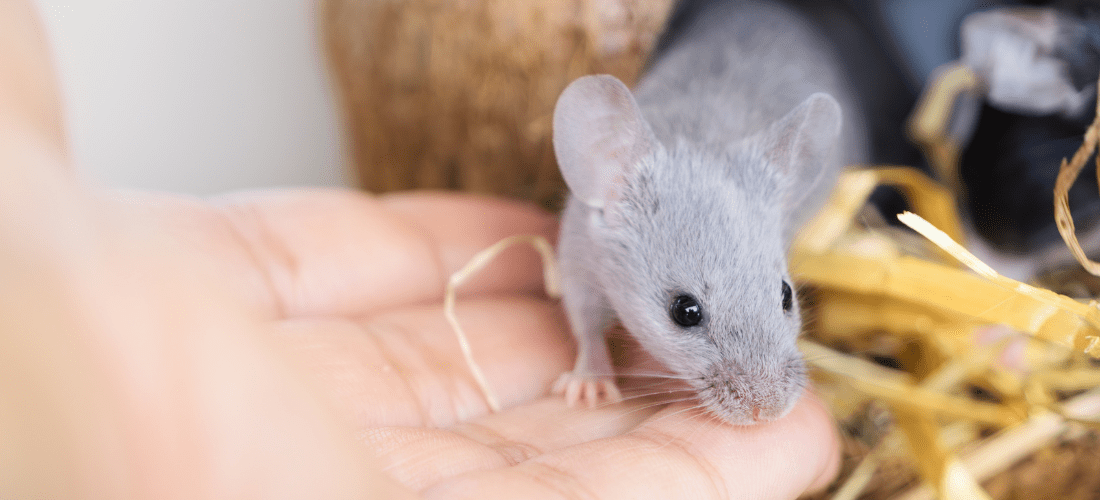
Mice are prey animals, so being picked up can be scary for them. However, if you’re quiet, gentle and patient they might let you stroke them inside their cage, and take treats from your hand. It’s a good idea to get your mice used to being stroked and held from a young age so they won’t be too frightened when handling is necessary i.e. for vet visits.
It’s important to be gentle and careful when you handle your mice:
- Support their body: Gently cup your hands around the mouse, supporting their whole body.
- Hold them low: Keep your hands close to the ground in case they jump.
- Be patient: Let your mice get used to being handled slowly.
Children should always be supervised when handling mice as they need to be handled carefully and can bite. If you’re looking for a pet that usually enjoys being picked up and held, consider rats or ferrets instead.
Common health problems in mice
It's important to monitor your mice closely for signs of illness. If you notice any changes in behaviour or appearance, consult your vet promptly.
Common health problems in mice include:
- Tooth problems: these are common in mice because they have continuously growing incisors (front teeth) that need to be constantly worn down by gnawing. If these teeth become overgrown, they can cause difficulty eating, pain, weight loss, and drooling. Mice with dental problems can also develop facial swelling and may rub their face on their cage.
- Skin problems: skin problems in mice can be caused by infections, parasites, or barbering (when one mouse chews another's fur). Symptoms include itching, hair loss, and red skin.
- Gut problems: symptoms include diarrhoea, loss of appetite, and dull or rough fur.
- Respiratory problems: symptoms include laboured or rapid breathing, sneezing, coughing, chattering, head tilt, reduced grooming, and weight loss.
- Old age issues: as mice age, they are more prone to developing certain health issues, such as heart disease, arthritis, and vision problems. Watch for signs of slowing down or difficulty moving.
- Tumours: These are unfortunately very common in mice, especially mammary (breast tissue) tumours. They can grow quickly and while removal is possible, surgery is risky and the tumours often return.
Prevention is key - ensure your mice have a clean environment, a balanced diet, other mice to keep them company, and plenty of opportunities for exercise.
How to introduce new mice
Mice are incredibly sociable so should always be kept in pairs or small groups. However, introducing mice to one another is a delicate process, which requires patience and supervision. For the best chance of a successful introduction, follow the steps below:
- Sex your mice: before introducing mice it’s essential to know their gender and follow the pairing guidelines above.
- Neutral territory: It’s always best to introduce new mice in a space that neither group/individual has been before, such as a clean cage or secure playpen. This is to make sure there are no existing scents that could cause aggression. To begin with, avoid giving them any toys, hiding places, food or drink so there is less territory to defend and you can see them at all times.
- Introduction: place the lone mouse/smaller group in first and allow them to settle for a few minutes before introducing the larger group.
- Monitor: monitor them carefully, it’s normal to see squeaking, sniffing, chasing. These are normal behaviours to establish dominance within the group - try not to panic! However, if blood is drawn separate the mice immediately. Assess the extent of the injury, if a small nip, it can be worth trying an introduction again in a few days, but if repeated it may be best not to mix the group.
- Toys and food: if the new group are getting on, give them some toys, hiding places, a water bottle and some food. Keep monitoring them and make sure all mice have a chance to eat and drink.
- Continue: If all continues going well, keep the new group in this smaller neutral space for several days before moving them into their normal enclosure.
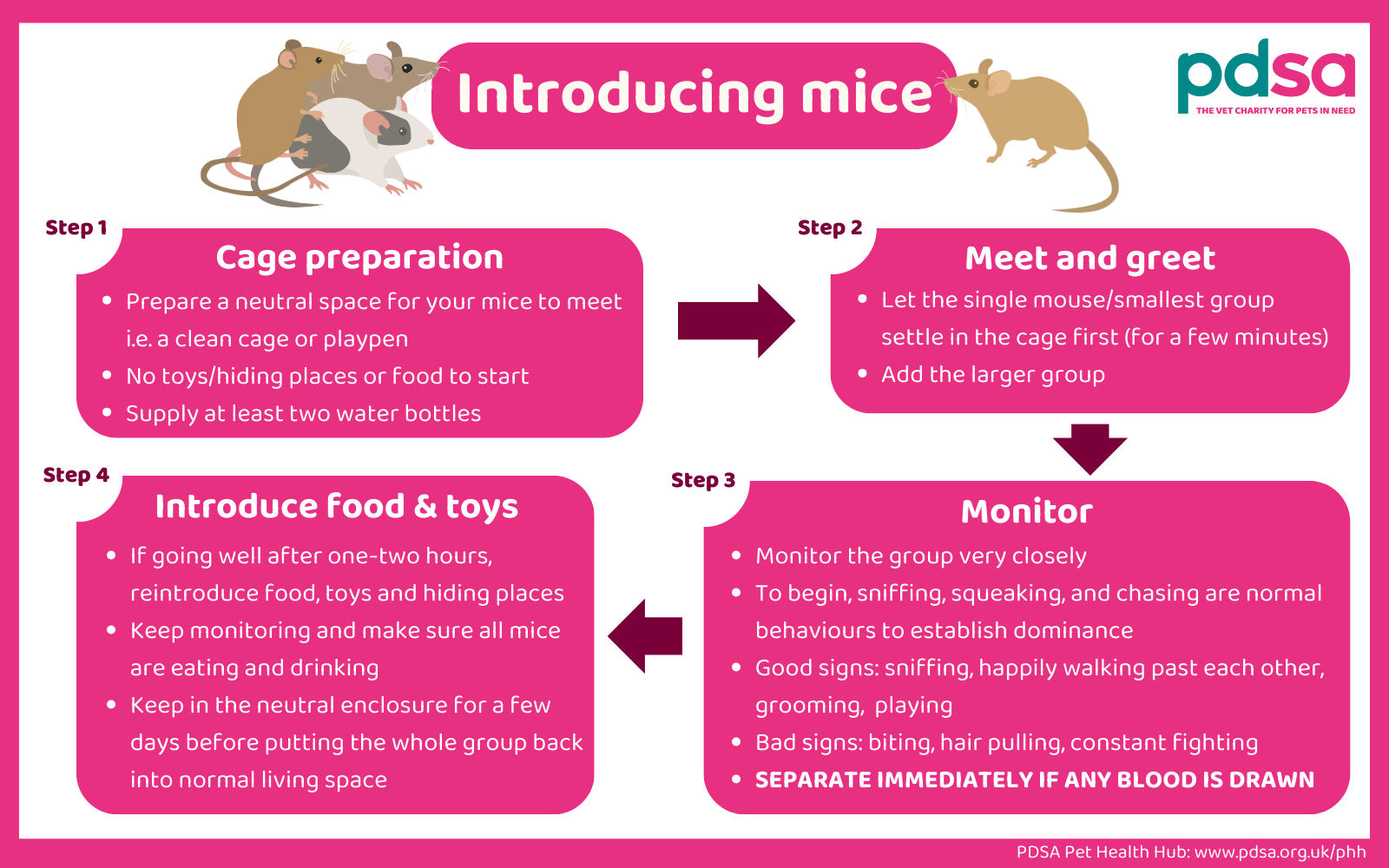
- Is it normal for mice to eat their own poo?
- Can I give my mice wood from the garden to chew?
- Can you introduce new mice to an existing group?
Is it normal for mice to eat their own poo?
Yes, it’s important for your mice to eat their own poo because it helps keep their gut healthy. Just like rabbits, mice produce two types of poo, one that they eat, and the other they don’t. The first type of poo (known as a ‘caecotroph’) is soft and full of nutrients - your mice will eat these. The second is a harder, drier poo which your mice will leave.
Can I give my mice wood from the garden to chew?
Yes, mice can gnaw on several types of untreated softwood, many of which you can find in your garden (see image above). However, before you give them any branches to chew, give them a good wash and bake them on a low heat for an hour to make sure they’re clean.
Can you introduce new mice to an existing group?
Yes, in fact this is recommended! Especially if you find yourself in a situation with a lone mouse (common in pairs where one passes away). Mice are incredibly sociable and should be kept in pairs or small groups. Check out our step by step guide above.

